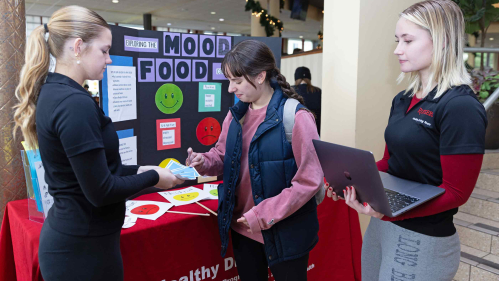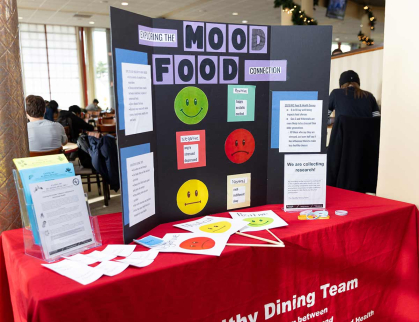What’s Cooking in the Dining Halls? Undergraduate Research.

Students at Rutgers–New Brunswick turn eating areas on campus into living laboratories as part of an international collaborative program
At Rutgers University–New Brunswick, even the cafeterias are being used as teaching tools.
That’s because Rutgers–New Brunswick has been a part of the Menus of Change University Research Collaborative (MCURC) – an international network of colleges and universities that use campus dining halls as living laboratories – since 2017.
“A dining facility, be it a dining hall, a diner, a cash operation … can be a living laboratory by looking at records, looking at patterns, looking at behaviors,” said Peggy Policastro, a registered dietitian and director of nutrition for Rutgers Dining Services.
Policastro, who also is the director of nutrition and culinary literacy for the New Jersey Heathy Kids Initiative, is a co-chair of research and education for the Menus of Change collaborative. The goal behind the collective research effort, founded in 2014 and led by Stanford University and the Culinary Institute of America, is to advance healthy, delicious and sustainable food choices using evidence-based research, education and innovation.
She said being part of the collaborative involves more than having a dining facility.
“You have to have researchers, academics, who are part of this,” Policastro said. “That way they can carry forward the research that's done. This is the way for dining facilities to collaborate with their university research areas.”
Through the collaborative, Rutgers–New Brunswick provides a not-so-common opportunity for undergraduate students to conduct research.

Among the undergraduate researchers is Alyssa Guidetti, a senior studying nutritional sciences at the School of Environmental and Biological Sciences.
“It's an amazing opportunity and something that really I feel sets me apart,” said the 20-year-old resident of Hazlet, N.J. Guidetti added she recently went through the graduate school interview process “and it definitely is a standout opportunity that I am able to experience and learn from.”
Allison Righter, co-director of the collaborative and director of health and sustainability programs for the strategic initiatives group at The Culinary Institute of America in Hyde Park, N.Y., said Policastro “is a critical and cherished leader of the MCURC” who mentors Rutgers participants in the MCURC Student Fellows program, which allows undergraduate and graduate students to gain experience conducting research.
Righter said Policastro mentors Rutgers students “as they conduct research and leads unique operational research culminating in both peer-reviewed academic publications and operational toolkits.”
“I have research assistants who actually are collecting the data,” Policastro said. “They're actually writing the institutional review board documents. They are involved in analyzing the data and involved in writing the manuscript. They also recruit students to be involved in the studies.”
The project Guidetti worked on began as a study at Stanford University: Researchers wanted to investigate the effect on athletic performance of eating a plant-based diet – and whether it was beneficial or if it inhibited athletic performance.
Guidetti said Policastro, knowing of the student’s interest in nutrition, sports and athletics, asked her to lead the study at Rutgers–New Brunswick.
It's an amazing opportunity and something that really I feel sets me apart.
Alyssa Guidetti
senior studying nutritional sciences
“We're working with recreational athletes, not people who are athletes at Rutgers University, just people who go to the gym on their own time,” said Guidetti, who grew up as a competitive cheerleader and enjoys running for exercise. “And we're having them eat plant-based food for four weeks and an omnivore diet for four weeks and seeing the results on their athletic performance. And we're working with resistance trainers and runners.”
Guidetti added: “I've been doing the whole research process and it's very eye-opening, but I do get to collaborate with all of the universities participating if I have any questions.”
Another undergraduate researcher, Rachel Ho, 21, worked on assessing college students' knowledge of plant-based protein sources.
Student researchers set up display boards at the four Rutgers dining halls with different categories of “good source” and “not a good source” of protein. The researchers then presented six different plant-based food items – oats, a potato, almond, milk, fruit loops, black beans and lentils – to student participants who were asked to indicate whether each food item was a good source of protein or not.
Ho said according to the results, 43.6% of students had incorrectly identified almond milk as being a good source of protein.
I think learning how to do research and learning research language is probably one of the best things that happened to me in terms of advancing professionally and developing professional language.
Rachel Ho
undergraduate researcher and senior
“And we concluded that when they incorrectly assumed that almond milk was a good source of plant-based protein, it could mean that when they're making the switch to plant-based milks, which is a trend now with switching from dairy milks to plant-based milks, they could be missing out on important nutrients that regular dairy milk could have,” said Ho, who will be attending Rutgers University–Camden to pursue a master of arts in teaching degree with a concentration in family and consumer sciences.
Ho – who presented findings from her research during the Food and Nutrition Conference and Expo held in Denver in October and at the annual meeting of the New Jersey Academy of Nutrition and Dietetics in Freehold, N.J., in April – said she was “very fortunate” to be a part of the research collaborative.
“I think learning how to do research and learning research language is probably one of the best things that happened to me in terms of advancing professionally and developing professional language,” the Edison, N.J., resident said. “And it helped a lot with my general professional development.”
Noting Policastro’s “shared role in an academic department as well as in dining services,” Righter said the Rutgers educator “is uniquely qualified and valuable to the collaborative in bringing MCURC research to life,” adding that Policastro “has helped democratize the research process by making it more easily accessible to undergraduate students as well as food-service operators.”
Policastro said: “We're not only changing lives now, but potentially impacting future generations as well.”


